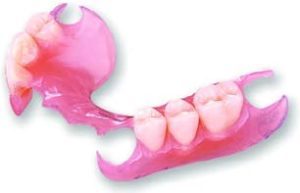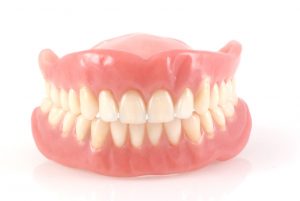Dentures
Dentures are artificial teeth and gums that are formed to your mouth and created by your dentists to replace lost or removed natural teeth. Dentures can either be full or partial, meaning they can either replace all teeth on either the top or bottom gum line, or just a few that are missing. Regardless of what kind of dentures you may need, they will be custom designed to fit your mouth, and visually matched to your existing teeth.
Partial dentures
Partial dentures are often used instead of other tooth replacement methods when the surrounding natural teeth are not strong enough to support structures such as dental bridges, or when more than one or two teeth are missing.
The partial dentures are fitted to the part of the gum line that they will sit on, and fasten to nearby natural teeth to keep from falling out of place. They are not permanently fastened, however, and can be easily taken out at any time for cleaning and while sleeping.
Full dentures
Full dentures, otherwise known as complete dentures, are dentures that replace all of your natural teeth. You can have them fitted for your top or bottom gum line, and are held in place by suction and/or the help of an oral adhesive. Just like partial dentures, they are easily removable.
Immediate dentures and overdentures
There are some other kinds of full and partial dentures that differ from traditional permanent dentures including a type called immediate dentures. These dentures are created before the teeth that are being replaced with dentures have been removed and are used immediately after tooth extraction and during the healing process, which can be up to six months long. These dentures can be more easily refitted than permanent dentures to accommodate for mouth changes as the swelling in the gums and jaw subsides while healing. The immediate dentures will be disposed of once the healing process is complete and your mouth is ready for permanent dentures.




How to clean dentures
Regardless of what kind of dentures you may have, all dentures need to be cleaned daily, just like regular teeth. Even though dentures are made up of artificial teeth, bacteria, plaque, and tartar still build up on them and can harm existing teeth and gums.
To clean your dentures, take them out of your mouth and run clean water over them to dislodge any food particles that may be stuck between teeth, along the gum line, or underneath the structure. Then brush the dentures all over with a denture brush or very soft toothbrush using a mild soap or denture cleaner. Be sure not to use any other cleaners, regular toothpaste, or electric toothbrushes as these are all too abrasive and can damage and wear away the denture materials. After cleaning, make sure to rinse them well.




